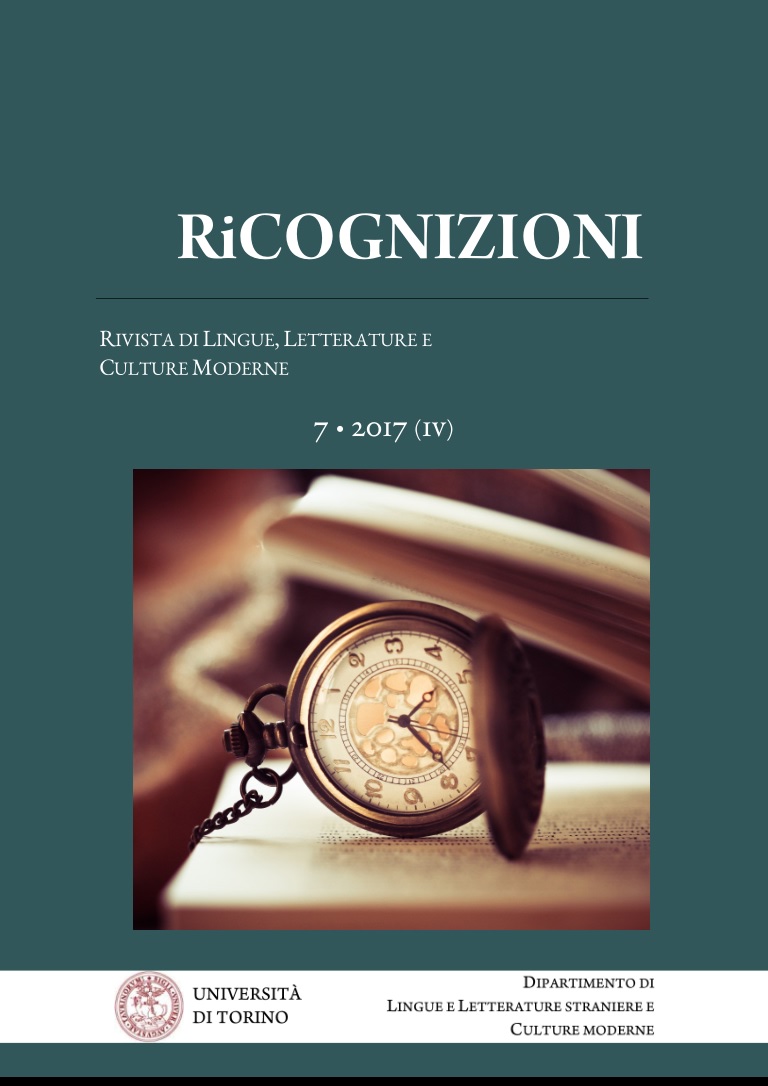A Possible Poetics of the Subversive Prose under Communist Regimes
DOI:
https://doi.org/10.13135/2384-8987/2117Parole chiave:
THAW, SUBVERSIVE LITERATURE, NARRATIVE STRATEGIES, SYSTEM OF VALUES, POLYPHONIC NOVEL,Abstract
The breakdown of the epic wholeness specific to the Thaw novel enables writers to undermine the politics of Stalinism. Influenced by Vincent Jouveʼs analysis of the mise-en-texte of values, the paper emphasizes on undermining rhetorical strategies such as ellipsis, narrative focus or sympathy towards certain characters. One of the first occurrences of the ephemeral genre known as “the novel of the obsessive decade”, Marin Predaʼs Risipitorii (1962) is used as a case study for the defending a poetics of subversion.
Riferimenti bibliografici
Brandist, Craig (1996), Carnival Culture and the Soviet Modernist Novel, London, Macmillan Press LTD.
Brown, Deming (1993), The Last Years of Soviet Russian Literature Prose Fiction 1975-1991, Cambridge, New York, Melbourne, Madrid, Cape Town, Singapore, Sao Paulo, Cambridge University Press.
Clark, Katerina (1981), The Soviet Novel. History as Ritual, Chicago, London, The University of Chicago Press.
Gibian, George (1960), Interval of Freedom. Soviet Literature during the Thaw 1954-1957, Minneapolis, University of Minnesota Press.
Gillespie, David (2001), Thaws, freezes and wakes: Russian Literature, 1953-1991, in The Routledge Companion to Russian Literature, ed. Neil Cornwell, London and New York, Routledge, pp. 223-233.
Impey, Michael H (1992), Milan Kundera's Wisdom of Uncertainty and Other Categorical Imperatives: The Experience of the Contemporary Romanian Novel, in Literature and Politics in Eastern Europe, ed. Celia Hawkesworth, London, Macmillan Press LTD, pp. 59-74.
Komaromi, Ann (2015), Uncensored. Samizdat Novels and the Quest for Autonomy in Soviet Dissidence, Northwestern University Press.
Loseff, Lev (1984), On the Beneficence of Censorship. Aesopian Language in Modern Russian Literature, München, Verlag Otto Sagner in Kommission.
Jouve, Vincent (2001), Poétique des valeurs, Presses Universitaires de France.
Preda, Marin (2011), Risipitorii, București, Curtea Veche Publishing.
Simuț, Ion (2017), Literaturile române postbelice (The Romanian Postwar Literatures), Cluj-Napoca, Editura Școala Ardeleană
Suleiman, Susan Rubin (1983), Le Roman à thèse ou l'autorité fictive, Presses Universitaires de France.
Ștefănescu, Alex (2002), La o nouă lectură: Constantin Țoiu (Rereading Constantin Țoiu), in România literară, nr. 46, p. 11.
##submission.downloads##
Pubblicato
Come citare
Fascicolo
Sezione
Licenza
Gli autori che pubblicano su questa rivista accettano le seguenti condizioni:- Gli autori mantengono i diritti sulla loro opera e cedono alla rivista il diritto di prima pubblicazione dell'opera, contemporaneamente licenziata sotto una Licenza Creative Commons - Attribuzione che permette ad altri di condividere l'opera indicando la paternità intellettuale e la prima pubblicazione su questa rivista.
- Gli autori possono aderire ad altri accordi di licenza non esclusiva per la distribuzione della versione dell'opera pubblicata (es. depositarla in un archivio istituzionale o pubblicarla in una monografia), a patto di indicare che la prima pubblicazione è avvenuta su questa rivista.
- Gli autori possono diffondere la loro opera online (es. in repository istituzionali o nel loro sito web) prima e durante il processo di submission, poiché può portare a scambi produttivi e aumentare le citazioni dell'opera pubblicata (Vedi The Effect of Open Access).








